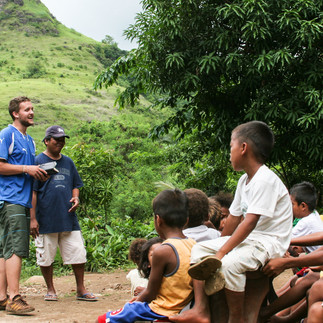GOD Int'l Educational Emphasis
- Guest User
- Jan 1, 2014
- 3 min read

Educational Emphasis
There is a paramount emphasis on education within our organization. This emphasis carries into all areas of service extended to the world around us. This means that it is not enough to know what to do, but everyone who does, must have a working concept about why they do. Exploring the 'why' helps to answer the 'how,' and it's the 'how we do it,' that sets our approach apart from similar trajectories.
An educated approach is of utmost value.
There Are A Wide Variety Of Responses To The
Many Issues Prevalent In Development Work.
An educated approach puts emphasis on 'the way' to respond to those issues. In addition, it allows us to, in the end, be open to even what answers will be appropriate to the particular questions based upon the uniqueness of the situation and factors involved. The way we'll go about answering is our concern.
Education Is A Fundamental Right For All Human Beings.
Without education, human beings are left under-developed, lacking the capacity to form the words necessary to communicate their thoughts. Without such an ability, human beings are left without a way to healthily participate in the forming of their world. Instead of contributing to meaningful co-existence with their neighbor, the uneducated can resort to being driven by their desires, leading to conflict and ultimately to violence. When this happens the distinctiveness between human and animal is blurred. Education, however, is the key factor in the humanization process.
The type of education spoken of here is not that which is commonly referred to as ‘higher education;' requiring state-of-the-art architecture, instructors with pedigrees, and more books than anyone would ever have the time to read. Instead, it is understood that education can take on many forms, informal or formal, tailored to adults or children, general education or specialty education. However, for whichever educational process is chosen, there is a particular objective that makes the chosen form legitimate. This objective should be to teach the type of critical thinking skills that lead to one’s intentional involvement in history, particularly with regard to how human beings are governed, and what it means for people to have a ‘good’ or ‘meaningful’ life.
“Education is the key factor in the humanization process.”
This educational objective must be appropriate to the recipient’s context in both their time period and locale. Whether they are children or adults, in an academic setting or on the field, achieving such an objective requires one to know the difference between education and indoctrination (or enculturation). The difference is not solely in the approach one takes to transfer information, but it is in the way one is taught to filter that information. By developing critical thinking skills, a person learns to question the conventional solutions of their day, and instead make their present moment a viable factor in their educational efforts. This approach helps the learner to solve real problems, enabling that person to meet real needs and not just theoretical ones.
Such needs are particular to a person’s time and their part of the world. Rather than attempting to conceptualize a utopian scheme of thought to achieve world peace, this type of thinking leads to conjunctive faith, where the ‘and/both’ is no longer ruled out by the ‘either/or.’ In other words, rather than thinking "our way is the right way," a person learns to hold both what is hoped for, and what is, in a single thought. With the weight of that reality, they work towards creating a better environment where reconciliation allows for unity amidst a diversity of perspectives. Such a person learns to work for peace. This is meaningful vocation.
Education leads to vocation, and vocation is not the same as occupation;There are many educational institutions whose concern is to create employees for the workforce--people who can fulfill the expectations of a prescriptive occupation determined by the top-down priorities of corporate think tanks. While such institutions have their place in history, they will never produce the kind of people who bring about the necessary change that allows the common man to tell their alternative perspective on history. Such people, are people of vocation.
Vocation is not ‘you are what you do,’ or ‘you are your job.’ Vocation is when you do what you do because of who you are. When a person comes to the realization that they themselves are a work in progress, someone becoming, they soon realize that who they are is a fluid concept, because much of their identity will be tied to meeting the needs of others, and demonstrating love through sacrificial living. Someone who pursues vocation is someone who is ready to become a lifelong learner, and a servant who bears the burden of those in need.













Коментарі